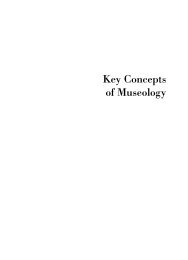ISS 25 (1995).pdf - The International Council of Museums
ISS 25 (1995).pdf - The International Council of Museums
ISS 25 (1995).pdf - The International Council of Museums
Create successful ePaper yourself
Turn your PDF publications into a flip-book with our unique Google optimized e-Paper software.
ICOFOM Stavanger <strong>1995</strong><br />
approaches do not exclude eachother. While the empirical-theoretical approach is mainly<br />
heuristic and the praxeological approach designs strategies <strong>of</strong> behaviour, the philosophical-critical<br />
approach wants to develop a definite point-<strong>of</strong>-view with resulting guidelines.<br />
Each approach has its own past, present and (probably) future. Once in a while the<br />
developments on each level interconnect in a special way and some synergy is created. In<br />
retrospective these moments are to be considered as turning points in museum history,<br />
frequently described as 'museum revolutions'3.<br />
Three approaches<br />
<strong>The</strong> empirical-theoretical approach aims at 'substantial rationality', i.e. the ability to see<br />
signifying relationships between different phenomena in reality. Its aim is mainly<br />
descriptive. It tries to understand museological phenomena in their historical and<br />
socio-cultural contexts. Its usefulness is primarily heuristic. <strong>The</strong> praxeological approach<br />
focusses on ' functional rationality'. Functional rationality is the ability to develop adequate<br />
means (methods, techniques, procedures) to realize ends that have been defined<br />
beforehand. Its aim is applicability. It should give very concrete answers to very concrete<br />
questions.<br />
<strong>The</strong> third approach towards museology concentrates on the development <strong>of</strong> a critical<br />
social orientation. In this respect StranskY speaks <strong>of</strong> 'programme orientation' instead <strong>of</strong><br />
'cognitive orientation". It is <strong>of</strong>ten suggested that the prevailing attitude among museologists<br />
is one <strong>of</strong> non-commitment. This criticism concerns museums, the museum pr<strong>of</strong>ession<br />
as well as museological theory. Views as to a more active social role <strong>of</strong> museums<br />
initiated some explicit opinions concerning the programme orientation. <strong>The</strong>re are (were)<br />
tWo main schools <strong>of</strong> thought: 'marxist-leninist museology' and 'new museology' . In<br />
addition some approaches are published which could be described as 'critical museology' .<br />
Marxist-leninist museology was a very normative approach, where axiological norms are<br />
applied leading to a rather strict system <strong>of</strong> rules. New museology and critical museology<br />
advocate an attitude rather than the application <strong>of</strong> rules. As it was stated at one MINOM<br />
conference: 'there is not just one methodology in new museology, there are several<br />
possibilities depending the prevalent conditions". <strong>The</strong>orization should have the role <strong>of</strong><br />
•<br />
<strong>The</strong> term 'museum revolution' was used first by Duncan Cameron to characterise the radical<br />
changes during the 1950s and 1960s in the United States ('<strong>Museums</strong> and the world <strong>of</strong> today.<br />
Museum reform in the 1950s and 1960s', [COM News 23, 1970, (2): 41-45). Other authors using<br />
the term are, for example, Waldisa Russio (,Museu, museologia, museologos e formacao', Revisla<br />
de Muse%gia I, 1989, (I): 7-1 I) and Antun Bauer (in 1983 in his contribution to Muzeologicke<br />
sesity 9) .<br />
Z.Z.StnlnskY, 'Museology: Deus ex Machina', in: V. Sotka ed., Museology and developing<br />
coW/tries - help or manipulation? ICOFOM Study Series 1 (Stockholm 1988) 207-214.<br />
Quoted in A.Desvalh!es, 'Basic paper' , in: V. Sntka ed., Museology and developing countries -<br />
help or mnnipuliltion? ICOFOM Study Series 14 (Stockhnlm 1988) 129-136.<br />
134
















